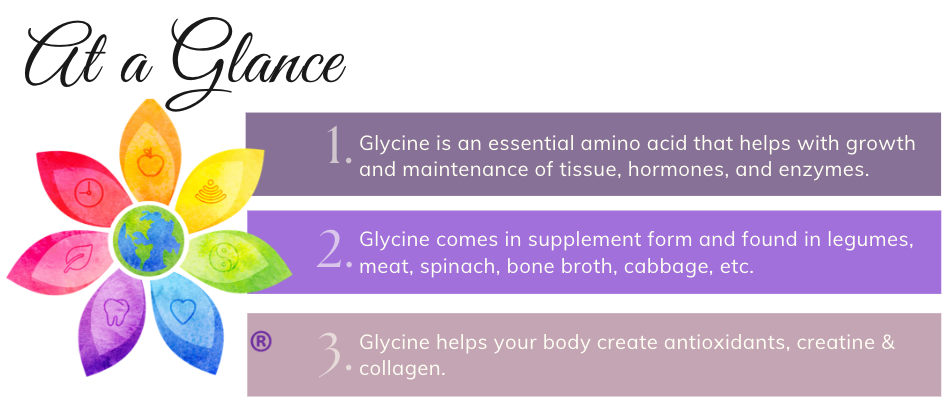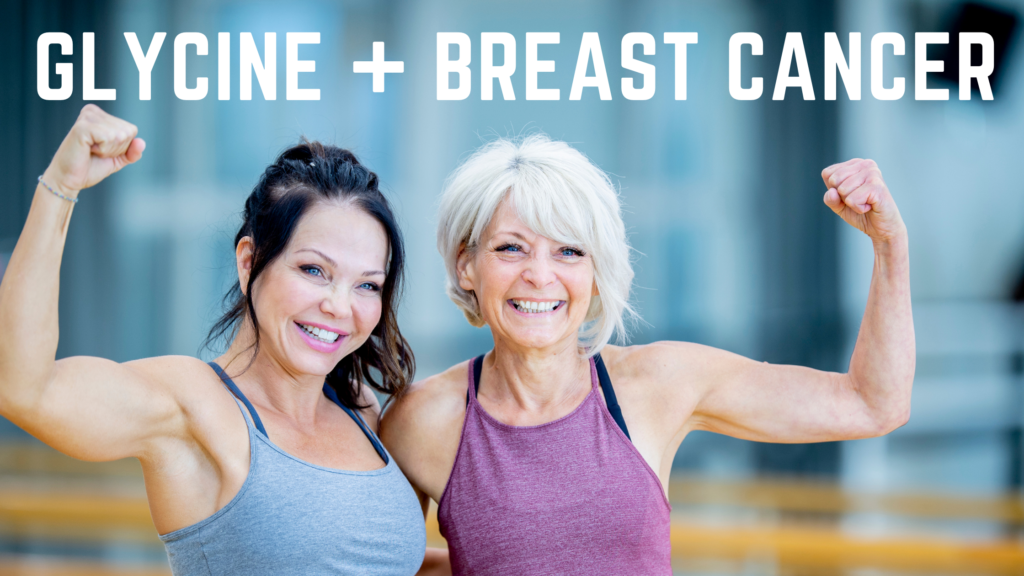
What is glycine?
Glycine is one of the nine essential amino acids that human bodies need to live. It helps with the growth and maintenance of tissue, hormones, and enzymes. But before we begin, here’s a quick blast from past science classes about amino acids:
- The nine essential amino acids are the following: histidine, isoleucine, leucine, lysine, methionine, phenylalanine, threonine, tryptophan, and valine. They all must come from food or supplements, as the body can not make them.
- In total, there are twenty amino acids, and the other eleven can be made naturally by your body.
- Most cell functions need proteins composed of organic molecules called amino acids.
Glycine provides loads of powerful health benefits that I will discuss throughout this article.
Before we dive in, here’s a bit more advanced information about glycine that you should know as you vibrantly age. It is one of three amino acids that your body uses to make glutathione—a powerful antioxidant that helps protect your cells against oxidative damage caused by free radicals. This damage has been known to underline many dis-eases. Additionally, without enough glycine, your body produces less glutathione. This can negatively affect how your body handles oxidative stress as you age.
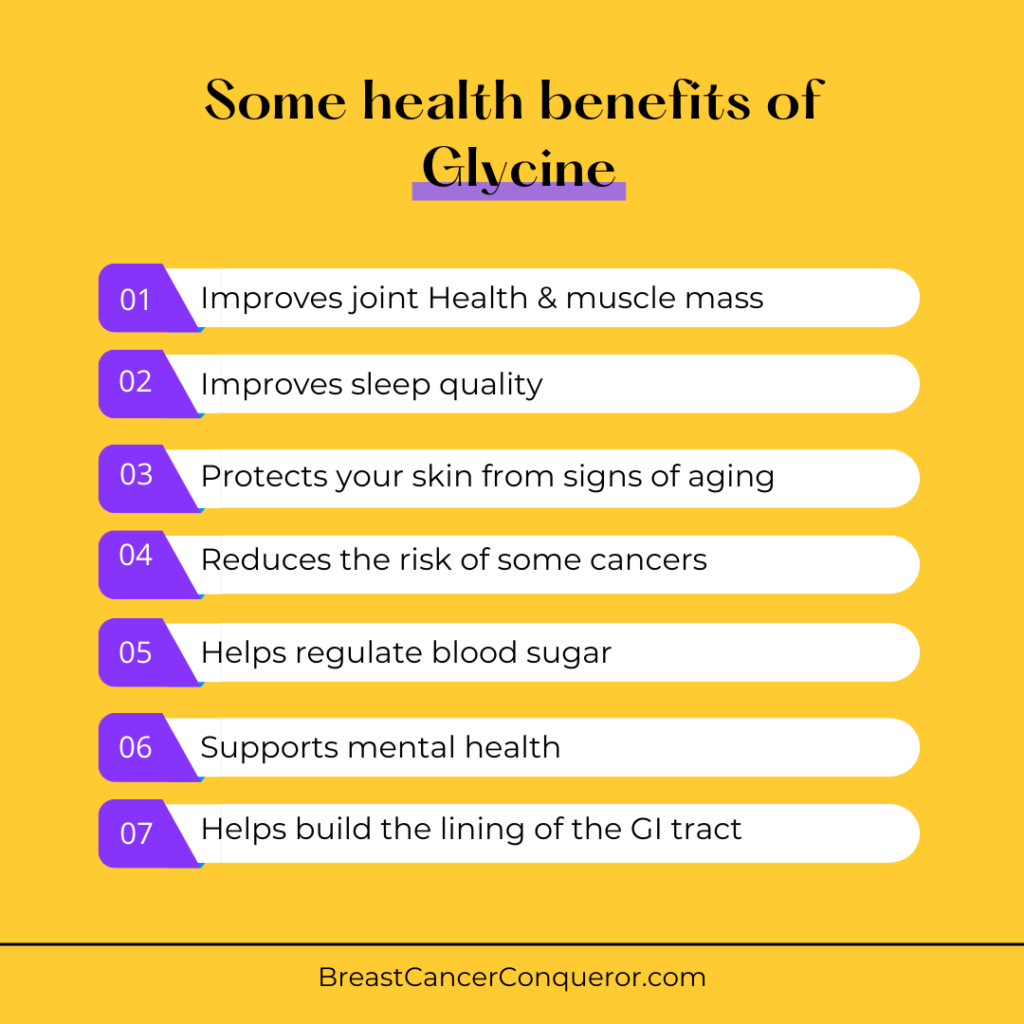
How do I consume glycine?
Glycine can also be found in high-protein foods such as:
- Legumes: tofu, peas, lentils, kidney beans, peanuts, etc.
- Fish and meat
- Dairy products: yogurt, cheese, milk, etc.
- Spinach
- Dried Seaweed
- Watercress
- Gelatin powder
- Bone Broth
- Asparagus
- Cabbage
Glycine’s supportive friends
Glycine is part of many of your body’s structures that help you heal, prevent dis-eases, and live a healthy and feeling-good lifestyle. Below are a few you should know.
Antioxidant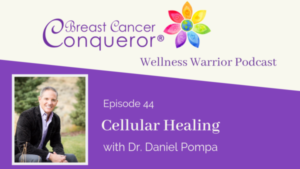
Cancer and many other health challenges can start with cell damage. Glycine is part of your body’s glutathione-making process, an important antioxidant protecting your body against cell damage. Please listen to this podcast episode with Dr. Daniel Pompa to learn more about cellular healing and fasting.
Creatine
Glycine helps your body produce the compound creatine. You may have heard of bodybuilders chugging excessive amounts in their shakes, but I am not suggesting you do the same. However, when your body has adequate glycine levels, it naturally produces creatine that can be beneficial for bone health (essential for preventing osteopenia after menopause), brain function, and neurological conditions like Parkinson’s and Alzheimer’s disease.
Collagen
Collagen strengthens your skin, nails, blood, bones, and ligaments. Every third to fourth amino acid in collagen is glycine. For many people, the amount of collagen decreases with age. Therefore, ensuring your body has proper glycine levels and even taking a small amount of a collagen supplement can be helpful—just make sure it is grass-fed!
When using the correct amounts, supplementing with glycine is safe and easy to do. Some studies have shown that using up to 90 grams of glycine per day over several weeks (which I do not recommend), did not give any of the participants any side effects. However, the standard dose used in most studies is about 3-5 grams a day.
Glycine and fasting
“Fasting can also lower the risk of cancer in general and slow tumor growth and metastasis.”
A study conducted by the University of California (USC) found that volunteers who fasted had reduced production of an enzyme called PKA (Protein kinase A). PKA is linked to an increase in cancer risk and tumor growth. A National Cancer Institute mouse model investigation discovered that “fasting just one day a week can increase the expression of the tumor-suppressing p53 gene.”
Fasting before chemo
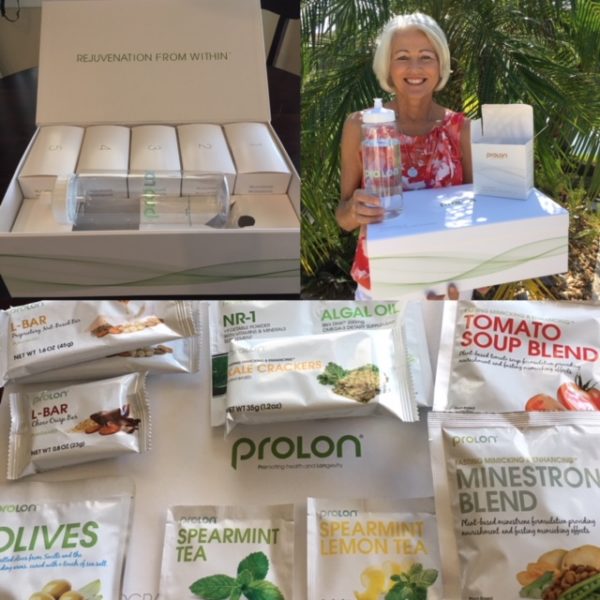 Some studies have found that fasting before chemotherapy or radiation treatment can reduce the harmful side effects. The Fasting Mimicking Dieting (FMD) and Intermittent Fasting (IF) are common types of fasting in addition to regular fasting. Below are the results from a study done via the UCSF Osher Center for Integrative Health.
Some studies have found that fasting before chemotherapy or radiation treatment can reduce the harmful side effects. The Fasting Mimicking Dieting (FMD) and Intermittent Fasting (IF) are common types of fasting in addition to regular fasting. Below are the results from a study done via the UCSF Osher Center for Integrative Health.
A study done on women with breast cancer undergoing chemotherapy and using the Fasting Mimicking Diet found that the FMD protected against the effects of the chemotherapy while enhancing the effect of the chemo, resulting in greater tumor loss.
In addition, A recent study analyzed data from the Women’s Healthy Eating and Living study and found that “breast cancer survivors who didn’t eat for at least 13 hours overnight had a 36% reduction in the risk of recurrence and were 21% less likely to experience breast cancer-related mortality.” “The proposed mechanism for this finding is thought to be related to better glycemic control resulting in protection against carcinogenesis. Each 2-hour increase in nightly fasting was linked to progressively lower hemoglobin A1C levels. This research is particularly interesting because it is a dietary strategy that most people could implement.”
Fasting Mimicking Diet® by ProLon
Glycine is part of ProLon’s version of the Fasting Mimicking Diet®. They provide you with meals that give you the calories (600) and nutrients you need to get you by while achieving the major health benefits of fasting. I talk more about this diet via this blog post, and you can buy the kit here.
Glycine as a sugar alternative
Since glycine has a touch of sweetness, you can use it as a healthy sugar substitute in tea, green juices, protein shakes, yogurt, coffee, etc. It is possible to get creative with consuming this supplement instead of just another pill to swallow. However, I wouldn’t bake with it since the heat can affect the amino acid structure.
